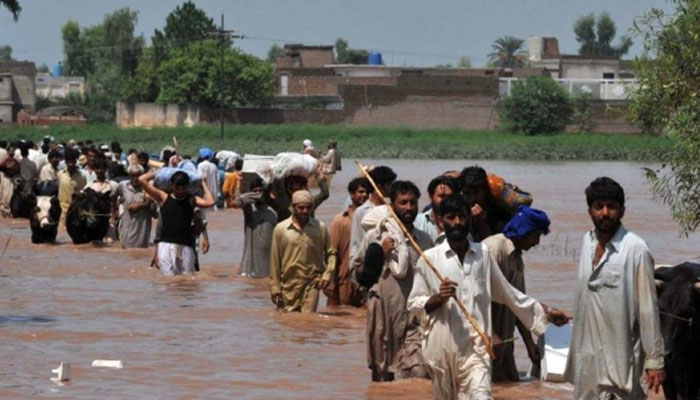The climate threat
Rain on Sunday alone led to the deaths of 12 people – two in Balochistan, six in Khyber Pakhtunkhwa and four in Punjab
Most Pakistanis may have forgotten the time when rainfall used to be a pleasant experience. Now, it brings chaos and anarchy. The current irregular rain patterns are a result of climate change, with the most recent spell of rains across Pakistan once again showing the irreversible and severe effects of climate change. Continuous heavy rains in the past few days have led to the deaths of at least 39 people across the country. Rain on Sunday alone led to the deaths of 12 people – two in Balochistan, six in Khyber Pakhtunkhwa and four in Punjab. In Peshawar, rescue workers had to use inflatable boats to transfer people to safety. Besides this, these rains have caused huge infrastructural damage that may require weeks to repair. So, does this mayhem show the unpreparedness of the government? The answer is not that simple.
Ever since the disastrous 2020 rains, our provincial and federal governments have shown urgency to tackle the climate threat. In 2022, flash floods compelled the Ministry of Climate Change to make a strong case for global funding for the rehabilitation of the affected areas. However, the response of the international community has been unsatisfactory. Pakistan is not a major carbon polluter. It contributes just 1.0 per cent to the total amount of carbon emissions, but it is the fifth most vulnerable country to climate change. While there is no denying that Pakistani leaders need to change course and allocate more funds to climate mitigation efforts, rich nations must realize that their unchecked growth and development are hurting smaller and relatively poor countries that do not have enough funds to make climate-resilient cities for their people.
Heavy rainfall will likely be a big threat this year. On Tuesday (April 16), metro stations in Dubai were left flooded after the city received a heavy spell of rain. Infrastructural damages were also reported in other parts of the country. Developed countries have the advantage of reconstructing the broken infrastructure timely. Pakistan does not have this privilege. Also, most countries take precautionary measures to ensure that there are no casualties. Here, deaths are regarded as an unfortunate inevitability. Pakistani stakeholders also need to change their approach to climate change. Raising our voice for financial support from the international community is valid, but we must have Plan B to reconstruct our cities on our own. Public-private partnerships can play a vital role in making the country more climate-resilient. There is also a need for the people to do their part to help the government deal with the climate challenge. The excessive consumption of plastic, for example, has intensified the climate crisis across the world. We need plans B, C, and D to deal with this crisis.
-
 Prince William, Kate Middleton Camp Reacts To Meghan's Friend Remarks On Harry 'secret Olive Branch'
Prince William, Kate Middleton Camp Reacts To Meghan's Friend Remarks On Harry 'secret Olive Branch' -
 Daniel Radcliffe Opens Up About 'The Wizard Of Oz' Offer
Daniel Radcliffe Opens Up About 'The Wizard Of Oz' Offer -
 Channing Tatum Reacts To UK's Action Against Andrew Mountbatten-Windsor
Channing Tatum Reacts To UK's Action Against Andrew Mountbatten-Windsor -
 Brooke Candy Announces Divorce From Kyle England After Seven Years Of Marriage
Brooke Candy Announces Divorce From Kyle England After Seven Years Of Marriage -
 Piers Morgan Makes Meaningful Plea To King Charles After Andrew Arrest
Piers Morgan Makes Meaningful Plea To King Charles After Andrew Arrest -
 Sir Elton John Details Struggle With Loss Of Vision: 'I Can't See'
Sir Elton John Details Struggle With Loss Of Vision: 'I Can't See' -
 Epstein Estate To Pay $35M To Victims In Major Class Action Settlement
Epstein Estate To Pay $35M To Victims In Major Class Action Settlement -
 Virginia Giuffre’s Brother Speaks Directly To King Charles In An Emotional Message About Andrew
Virginia Giuffre’s Brother Speaks Directly To King Charles In An Emotional Message About Andrew -
 Reddit Tests AI-powered Shopping Results In Search
Reddit Tests AI-powered Shopping Results In Search -
 Winter Olympics 2026: Everything To Know About The USA Vs Slovakia Men’s Hockey Game Today
Winter Olympics 2026: Everything To Know About The USA Vs Slovakia Men’s Hockey Game Today -
 'Euphoria' Star Eric Made Deliberate Decision To Go Public With His ALS Diagnosis: 'Life Isn't About Me Anymore'
'Euphoria' Star Eric Made Deliberate Decision To Go Public With His ALS Diagnosis: 'Life Isn't About Me Anymore' -
 Toy Story 5 Trailer Out: Woody And Buzz Faces Digital Age
Toy Story 5 Trailer Out: Woody And Buzz Faces Digital Age -
 Andrew’s Predicament Grows As Royal Lodge Lands In The Middle Of The Epstein Investigation
Andrew’s Predicament Grows As Royal Lodge Lands In The Middle Of The Epstein Investigation -
 Rebecca Gayheart Unveils What Actually Happened When Ex-husband Eric Dane Called Her To Reveal His ALS Diagnosis
Rebecca Gayheart Unveils What Actually Happened When Ex-husband Eric Dane Called Her To Reveal His ALS Diagnosis -
 What We Know About Chris Cornell's Final Hours
What We Know About Chris Cornell's Final Hours -
 Scientists Uncover Surprising Link Between 2.7 Million-year-old Climate Tipping Point & Human Evolution
Scientists Uncover Surprising Link Between 2.7 Million-year-old Climate Tipping Point & Human Evolution




